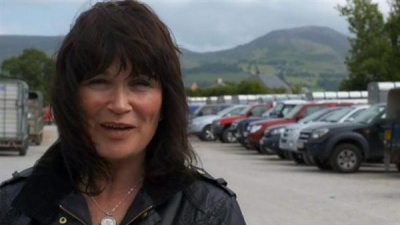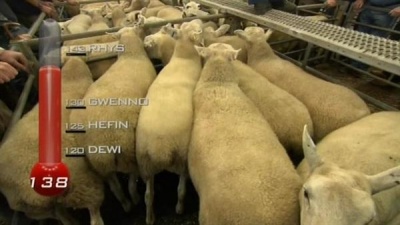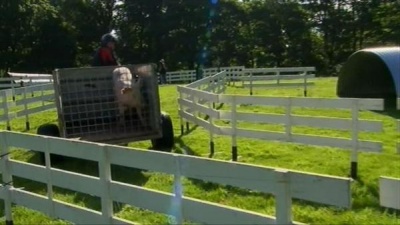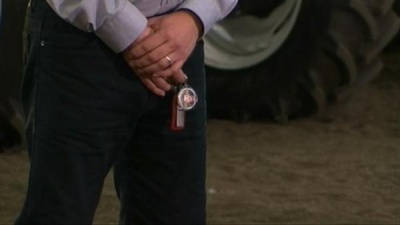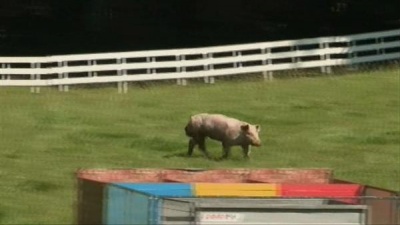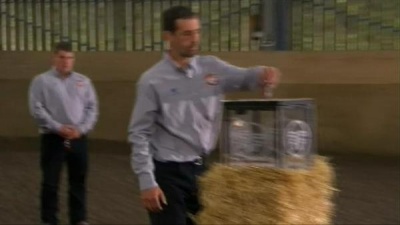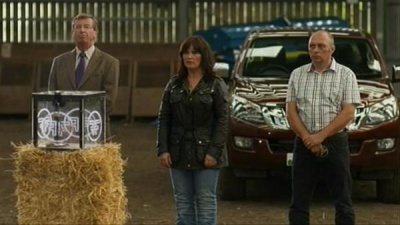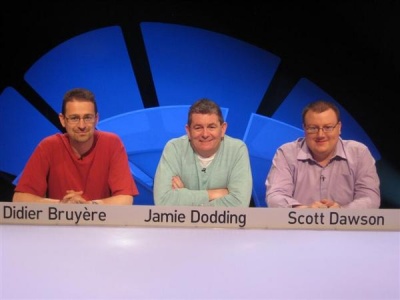Weaver's Week 2013-11-24
Last week | Weaver's Week Index | Next week
"I'm new to twitter drama... Gosh, it's a right laugh."
Contents |
Fferm Ffactor
Cwmni Da for S4C, from 16 October
The Week isn't afraid to go to the parts other television reviewers don't reach. We've delved into the productions from the Knightmare fandom fiction factory. We reached into the dim recesses of the EPG and found Staraoke, starring a much younger Laura Hamilton. Heck, we watched A Question of Taste.
Even foreign languages are no barrier to us. We've seen the Norwegian show Total Blackout. We've seen Whodunnit, a show conducted in fluent Yankee. And, thanks to S4C and The Cable Corp. reaching a deal about a year back, we've been filling our eyes with programmes in Welsh. Côr Cymru and Can i Gymru are high-profile specials, but there's just one of them each year. Fferm Ffactor has a full series each autumn, and we've been trying to make sense of this year's programmes.
The first thing to note is that the show has a very strange transmission schedule. In previous years, FF has been a half-hour programme, finishing at 9pm. This year, it's still had a half-hour ending at 9. But it's also had a half-hour ending at 8. In between is S4C's other massive entertainment programme, continuing drama Pobol y Cwm. Miss the first part and it's not a disaster, the second half still makes sense.
What is Fferm Ffactor? It's a competitive farming programme. How can there possibly be a competitive farming programme? Even after watching six weeks of the show, we're not entirely sure. There are agricultural experts on hand: tasks are set and adjudicated by Wynne Jones (a professor of farming studies) and Aled Rees (himself a farmer). We'll assume that they know what they're talking about, even if we have to rely on Sbectel 888 to translate what they're talking about.
The episodes are packed and pacy. This week's action featured a Price Is Right-style feature estimating the value of livestock; the competitors giving lessons at a primary school; examining and ranking the conditions of various cows; and performing basic surgery on a cow's hoof. It's a lively hour's viewing, and only the teaching task (which, in fairness, took up almost half the programme) was less visual and relied on knowing some Welsh.
Other tasks over the series have combined the visual and the verbal. The opening episode began with the inevitable introductions, and finished with a sit-down quiz, and in between went to a very visual obstacle course. That course secured its own spin-off programme for young farmers over the summer, because the best training for a life on the land is to fling around some plastic sheep and be squirted by a giant chicken with a water pistol.
There have been a lot of obstacle courses and tests of navigational ability: we've been treated to a tractor-handling course, hitching and dumping a trailer of grain while reversing around a corner. We've had a rally style exercise demonstrating the contestants' abilities behind the wheel of a 4x4 vehicle. There have been visual treats: a sheep-shearing exercise, getting the best fleece from an awkward ovine. But there have been some more sedate events as well; sit-down tests on cows and pigs, a challenge to recognise sheep breeds, and to identify unusual meats from smell and taste.
We've seen the most traditional challenges of all: hand-milking a cow, and a sheepdog trial. But Fferm Ffactor is happy to move with the times: picture clues are displayed on an electronic tablet, and we have seen those devices being used in preference to a board and chalk to record answers. It feels far more natural than the tablets used by John Barrowman on Pressure Pad, or by George Lamb on The Bank Job. And the grand prize is another modern convenience, one of those 4x4 vehicles, to which every player has been issued a key.
It's clear that "farming", in the definition used by Fferm Ffactor, is "animal husbandry"; very little attention has been paid to cereal farmers. In part, that's because there aren't that many cereal farmers in Welsh-speaking Wales to begin with, the industry is mostly sheep and cows and other livestock. And in part, that's because growing crops doesn't make for tremendously exciting television. In the fast-paced whizz-bang world of modern television, showing wheat and oats growing in real time isn't an obvious ratings winner.
It's also clear that the tasks are designed to favour no particular type of animal farmer. According to the theory, a good cow farmer will be able to give a reasonable estimate of the health of a sheep, while a good sheep farmer would be able to trim the nail on a trussed-up cow. Certainly the judging takes allowance of each competitor's specialisms, marking down the pig farmer who doesn't recognise a pork product when he smells it, and marking up people who transfer their skills and explain what they're doing.
As the contest's worn on, we have got a faint whiff of sugar, with tasks getting more business-oriented. It's as if we're tuned into Y ap Prentis, with Alan ap Sugar. A whole hour of television was devoted to a marketing task, getting the final six to come up with an advertising campaign for local butchers. We didn't understand what was going on, even with on-screen translation, and found the episode tremendously dull. The last episodes continue in this territory. We're promised some action from a livestock market, and the most gripping climax possible: a presentation to the leaders of the Farmers' Union of Wales.
Fferm Ffactor doesn't reject the tropes of reality television entirely. There is a confessional cab, a tractor equipped with a camera, to which the contestants can give their innermost thoughts. There's a general ban on swearing, with some words that would offend anglophone listeners bleeped out. (We don't know enough Welsh to know if they do the same for Pottimouth Cymraeg.)
And there's the weekly elimination, scripted and shot to a strict formula. The remaining contestants gather in a barn, some of them are called forward, and the judges determine who will survive and who will leave. We said how the players were issued with a key at the start of the contest: the eliminated person is required to drop their key into a box, and walk out of the barn doors, which close behind him with a satisfactory clunk. Heavily scripted, entirely ritualistic, still very climactic. Or, it would be, if the show didn't then ruin the atmosphere with two minutes of reactions and "coming up next week".
We've given Fferm Ffactor most of the series to impress us in some way. We're not sure that it's succeeded. Perhaps the split transmission makes each hour-long episode feel like it's occupied the whole evening. Perhaps the way that there's only so many things one can ask about livestock. Perhaps it's the language barrier: we really have to concentrate to wring out the meaning of the programme. Perhaps it's a cultural thing, we're not Welsh and this programme has Welshness (possibly a certain type of upland Welshness) running through every moment. It's certainly watchable, it's certainly not a bad production, it just doesn't do that much for us.
Certainly, the people who like the programme really like Fferm Ffactor. It's one of S4C's top-rated shows, typically behind only Pobol y Cwm and a programme of hymns and the live rugby. We can appreciate the reasons for its success: it's about a part of the culture that really resonates with S4C's audience, and it's done in an accessible and entertaining and informative way. Perhaps that explains why it doesn't work for this column: it's not a show designed to appeal to metropolitan anglophones. Might explain why the "UK" press have completely ignored this series.
Only Connect
Series 8, Match U: Oenophiles v Bakers
To the surprise of no-one, Victoria talks with the Oenophiles about wine. To the surprise of everyone, we find that one of the Bakers collects Asterix albums. Walls 383 and 384.
The Bakers kick off with signs that the volleyball match has finished, and a successful DRS challenge. That's cricket, the TV umpire has corrected a call. Two points for crossed arms. Oeno! Music for the Oenophiles: Robbie Williams and James *unt, and a schoolboy error: calling next and pressing the buzzer. "Jesus in a campervan", "Wisemen", and the guess of biblical characters (from the Nativity) is good. Luck is on the Oenophiles' side: 3-2.
Pictures for the Bakers: a boxer's ringsman, an early tablet computer, a mole, and a buzz. SI units, being a second and an Apple Newton. Good for two. Back to text for the Oenophiles: Japan is Round, Poland is Golden, Mexico is Weight, and Denmark is Crown. Scott has to lean over from a side seat to buzz in, and the team give the correct answer: literal translations of currency. 4-4.
Scandal in Jackson's Cabinet, Triangular pieces of shortbread, Political control by women, Middlesex Street market. Welcome to Only Connect, where we see all the clues and still have no idea. "All end in -gate", is the slightly pushing it response. "None of them end in -gate, otherwise a brilliant answer" replies the host. "Petticoat" is the word from Oenophiles, good for a bonus. On their own question, the Oenophiles have male leads in 3rd Rock from the Sun, tunnels in The Great Escape*, and buzz in for Tom Dick and Harry. Good for three, good for an 8-4 lead.
"Day is the time when you can see things". Not at this time of year, dear host. On to Sequences, where the Bakers begin with Timor, Arafura, Coral. Their answer is Andaman. No. The Oenophiles have Tasman; it's seas around the Australian coast, and good for a bonus. On their own go, it's 8: Latvia, 7: Slovenia, 6: Cyprus Estonia and Luxembourg. 5 is not Romania, 5 is not Greece. Ce n'est pas le contest du chanson Eurovision, mais c'est le number du MEPs que les nations avec. 5 is for Malta. (That's in the current distribution, likely to change for next May's election.) 9-4.
Back to the Bakers: Task and Individual and Load and a completely stumped guess. Not Function, not Delivery. It's Environment, being the TILE manual handling risk assessment. None of them are manual workers. For the Oenophiles: 4 of 7 is cross, 5 of 7 is joyful, 6 of 7 is somnolent, and 7 of 7 is – after some conferring – sneezy. Synonyms for the Seven Dwarves. 11-4 to the Oenophiles.
Last run for the Bakers: Receptor, Sensory neuron, and a buzz. It's not brain. Nor is it synapse. This is stages in a reflex action, the bits between stimulus and action, and it's motor neuron they were looking for. Pictures for the Oenophiles: a rugby team, a human trunk, three sets of semi-quavers. "A picture of something depicting two"; it's Harlequins, Quadriceps, Triplets, and a picture of The Thompson Twins. The pop band. All three of them.
Now 13-4 to the Oenophiles, and their score should increase on the walls. Have they got elements of a good cake? They might have: it's ingredients in bread. Another set is actors who played superheroes, and then they reckon they've got heads of a town, and we're not sure what they're proposing for the fourth group. Nor do the team manage to find the last two groups. "Yew, Mayor, Dough, Damn" sound like female animals; local dignitaries is the final link. Five points!
Ooh, Lightning Seeds songs is our first thought on the Bakers' wall. They're more concerned with finding some saints – except they turn out not to be saints, but characters played by Roger Moore. First group out, wrong link. They reckon there's a group of "chain" words. Or "pain" words. With about a minute to go, they spot the Lightning Seeds tunes, with leaves some very short words. "Junk ____" is a link they do get, and "Elchi, Pains, Laity, Pure" come out as anagrams of countries. Nasty. Six points!
So the Oenophiles lead by 18-10 going into Missing Vowels. Impressionists is good for the Oenophiles, winning 3-1. Landlocked countries includes an invocation of the Pointless rule: when in doubt, say "cntr lfr cnr pblc", 3-1 to the Oenophiles. Outer garments brings the Bakers back 2-1, but Folk music groups falls to the Oenophiles 2-1.
In the end, not a close match: the Bakers have 15, the Oenophiles win with 27.
This Week And Next
University Challenge continued, and as it's been six weeks since the last one, we need another Oxford-versus-Cambridge battle. It's the fifth of the series so far, and pits repêchage winners Christ Church Oxford against Clare Cambridge – the latter beat Loughborough back in August. Christ Church got the first two starters, Clare the next three, including a very early buzz on the derivation of "Prometheus". We're not sure who is the "Tony Badger" mentioned by Clare in a "say something, it might be right" guess; the answer was a great question setter's standby, "Margaret Thatcher".
Having taken the lead, Clare weren't prepared to relinquish it without a fight. Every time Christ Church got a starter, Clare came back with a couple of their own. They needed to hear just one note to recognise Verdi's "Dies irae" (OK, one note repeated a few times.) Later in the week, the question-setters will be criticised for suggesting that some traditional plainchant was written by Dvorak; whoever wrote it, it wasn't Smetana as Clare claimed. Christ Church might have benefited from their extra match, winning a buzzer race to say "leek, meek, and Greek"; their reward is to name cities from their metro stations. It brings them within five points.
And Clare promptly get the next starter. They won't let go. They just won't let go. The buzzer skills are good tonight, not until the second visual round did we see a starter evade both sides. The bonus skills, not so hot: neither side managed to get half their extra questions right.
And then, with two minutes to go, Christ Church answer two starters in a row, get some bonuses in the middle, and briefly retook the lead. But only briefly: they got none of the later bonuses, and Clare retook the lead with the next starter. Christ Church won a buzzer race to spell "facsimile", got it right, and the gong went. The match is drawn, 165-165.
University Challenge refuses to accept a draw as a proper result, and insists on determining a winner for every match. How very tiresome: we'd love to see nine sides in the final eight. Tom Wright got the additional starter, and Clare Cambridge will be rejoining us next year.
As part of next year's Sport Relief campaign, the BBC will be making a game show for dogs. That's not as in "a programme of special interest to canine viewers", but something intended to entertain humans as well. Perhaps a show where the woofers compete in a variety of mental, physical, and psychological tests to find the United Kingdom Superdog of Twenty Fourteen. We fully expect The Keeshond Factor to be hosted by Ashleigh and Pudsey.
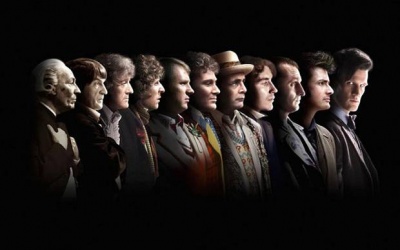 The Beeb's also been shooting an eleven-player version of The Krypton Factor. Who will win?
The Beeb's also been shooting an eleven-player version of The Krypton Factor. Who will win?
There's been a tiresome spat between last year's unbeaten The X Factor contestants. James Arthur used anti-gay slurs while addressing someone else, and was chided by Lucy Spraggan. Lucy knows from bitter personal experience what it's like to be called names by thoughtless people. Rather than acknowledging his error, James whipped out some lame excuses, such as "my album was self-penned", and because he sold more albums, this automatically made him more right.
Neither claim stands up to a moment's scrutiny. James wrote his album alongside 35 (THIRTY-FIVE) other people. The co-writing credits on Lucy's album* are (checks sleeve notes) two others. The scores reverse when considering the quality: we cannot remember how James's last single went, and have been known to holler the chorus of Lucy's last in the middle of London, at midnight, while wearing zombie makeup. (Our apologies to people around Fenchurch Street, but your streets are paved with stone.)
James may have enjoyed larger first-week sales, but we don't see that he's built up a loyal and vocal fanbase, and we note that digital retailers are offering refunds on undelivered copies of his album. Sold silver, returned gold. And we don't appreciate any argument that runs along the lines of "listen to me, my hits are bigger than yours." Otherwise, true power in the UK would rest with an uneasy coalition of Cliff Richard, Paul McCartney, and Elton John.
BARB ratings in the week to 10 November, when Strictly Come Dancing had 11.25m viewers, and The X Factor (defending champion: James Arthur) just 8.4m. There's only one winner this year. HIGNFY came in third, with 5.25m, but there was a strong challenge from the music edition of Pointless Celebrities (4.95m). Masterchef The Professionals returned with 3.6m, and University Challenge (3.3m) beat The Chase (3.25m). Mastermind notched up 2.15m.
Celebrity Juice continues to dominate ITV2, with 1.705m tuning in. Come Dine on C4 had 1.4m, 8 Out of 10 Cats 1.3m, and Channel 5's Most Shocking Talent Show Moments got 1.1m viewers. Their run of Greatest Kids TV Shows (930,000) was topped by Blue Peter. To the naysayers, one question: when did Sooty or Knightmare single-handedly save a country, like Blue Peter did for Cambodia in 1979?
920,000 for Only Connect, 805,000 for Xtra Factor, and 570,000 for Come Dine on More4. Property development show Beat My Build isn't going to do much in its morning slot on Channel 4; repeated on 4seven on Sunday evening, it had 145,000 viewers. Portrait Artist of the Year had 110,000 tuning in to Artsworld, and there were 38,000 of us watching Fferm Ffactor.
Four words for Richard Bacon and Chris Tarrant: Show Me the Telly (ITV, 4pm weekdays). In a week so quiet we're heading straight to Saturday, it's Pointless with Susie Dent, Robert Peston, Dan Snow, and Germaine Greer (BBC1, 6.15). Then straight to ITV for The Chase with Eric Bristow and Ed Byrne (comedian) but also Nadine Dorries (disgraced politician). Strictly Come Dancing has a theme of musicals, The X Factor has Jukebox Week, with the Grate British Public choosing the songs. Channel 4 tells us How Video Games Changed the World with Charlie Brooker (9pm).
To have Weaver's Week emailed to you on publication day, receive our exclusive TV roundup of the game shows in the week ahead, and chat to other ukgameshows.com readers, sign up to our Yahoo! Group.

